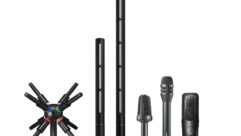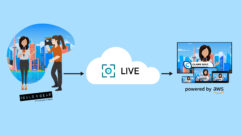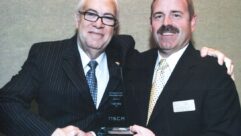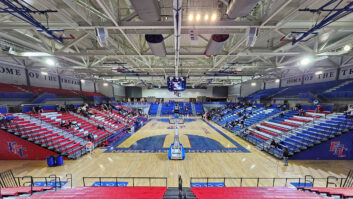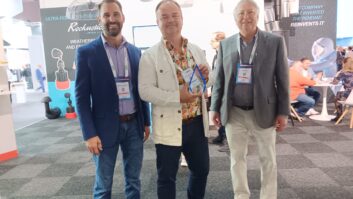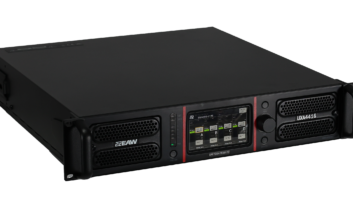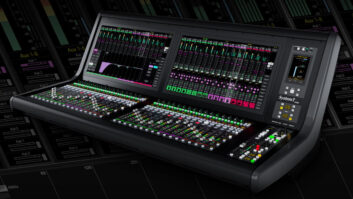
Conservatory Invests in Student Laptop Program
Apr 16, 2008 12:00 PM,
By Linda Seid Frembes

The Conservatory of Recording Arts and Sciences (CRAS) is the premier school for audio recording, engineering, and production education with campuses in Tempe and Gilbert, Ariz. The Conservatory’s 900 hour Master Recording Program II is a 42-week program in which students spend 30 intensive weeks on campus learning about sound reinforcement, troubleshooting/maintenance, music business, digital recording, and analog recording.
“Our program is only about audio. At any one time, there are about 480 students onsite and another 150 students out on internships,” says Kevin Becka, director of education for the Gilbert campus and an audio recording and production instructor, musician and studio engineer who has worked with Kenny G, George Benson, Michael Bolton, and Quincy Jones, among others. He is also the technical editor for Mix Magazine, an ASCAP member, and a voting member of NARAS.
Each year, CRAS graduates nearly 800 students after each has passed the coursework and completed a mandatory 280-hour internship. The students go through 10 three-week cycles, and every cycle has three recording classes and a mix of other audio-centric classes—with no more than 12 students in each. The first cycle is classroom work where instructors teach basics such as the physics of sound and introduction to the various technologies. The proceeding cycles are more hands-on such as in the mix lab where students can work on one of six Allen & Heath consoles in groups of two. “They will be asked to do certain tasks like patch audio, create a mix, add reverb to vocals, and the instructors will check their work,” Becka says.
The sound-reinforcement classes include work in the inhouse 6,000-square-foot venue with full staging and lighting where students learn on five different consoles including the Yamaha PM3500 and the Roland RSS M-400 V-Mixer. The real-world setting also includes an L-Acoustics Kudo line array, Lab.gruppen amplifiers, EAW Smaart Live software for system tuning, and in-ear monitoring systems from Sennheiser and Shure. “They can also do remote recording from that room onto Digidesign Pro Tools rigs, which is quickly becoming an industry-standard procedure in sound reinforcement,” Becka says.
1
Conservatory Invests in Student Laptop Program
Apr 16, 2008 12:00 PM,
By Linda Seid Frembes
Recently, CRAS instituted a new laptop package program for incoming students. Launched in December 2007, the package includes an Apple MacBook, Apple Logic Studio, Pro Tools M-Powered Academic, an M-Audio Fast Track Pro interface, Sennheiser eH 150 headphones, and a Sennheiser evolution series e 815S-X microphone. “Every student gets a laptop package; it is folded into the price of tuition,” Becka says. “Their first weekend is an 8-hour intro laptop class where they learn computer basics, how to connect to our learning management system and use the hardware. Because we’re running software that is dependent on specific Leopard OS versions, students cannot upgrade any software on their own unless it is authorized by us. This assures that everyone’s experience is the same, the gear works when we boot it up in class, and the program can run smoothly. They leave with the laptop package at the end of the program.”
Components of the laptop package were chosen using several parameters, including the ability to work with both Pro Tools and Logic platforms. Becka says that they wanted real-world gear with a recognizable brand. “Are they reliable and available? That is important since we will buy 800 of each per year on a schedule that calls for 48 systems every three weeks,” he says. “We looked at all major microphone brands, ran tests, and looked at quality and warranty. We liked Sennheiser because we needed to be sure with their customer service. Sennheiser is very attentive.”
CRAS keeps three cycles worth of products in-house and Becka added that their local dealer, Jim Weingard of BKW in Tempe, is great about handling inventory and warranty returns. Aaron Berg, a local Sennheiser sales representative, was also instrumental in the transaction.
Kirt Hamm, administrator of the Conservatory of Arts and Sciences, noted in a recent press release: “Because we’re serving 480 students at any one time at ten levels in the program, it’s not easy to make changes. We had to get this package right from day one. Quality was of the essence, not only from an audio standpoint, but also from a reliability and durability standpoint. We had to have gear that would stand up to daily use across a wide range of applications.”
According to Becka, the laptop package program was two years in the making but the results have been immediate. “We had a printing bill of $10,000 per month, and that has been cut down to $1,000 per month,” he said. “We can PDF instead of paper, and all students can electronically access course content without the need for us to print it for them.”
The school also uses Moodle , an open source course management platform that they have rebranded as “CRASConnect,” which gives them ultimate flexibility in user rights on the network. “On day one, a student is given a Moodle account and an email address. Using Moodle, we can control how quickly students progress in the curriculum and how well they’re doing. People can’t jump ahead,” Becka says. “And using Apple Remote Desktop, the IT department can see what students are doing at the server level. They monitor whether people are instant messaging or updating their MySpace page during class. Violators get called out of class and have to leave for the day.”
Testing is done within Moodle and using the starQuiz computerized testing program. “It eliminates the cheating aspect. We use a random generation of test questions from a pool of questions, so not every student gets the same test,” Becka says.
CRAS is constantly finding new ways to use the laptops to give the students and instructors a better on-campus experience. The facility is also evaluating new technology and will phase in updates to the laptop package as audio hardware and software evolves.
2



